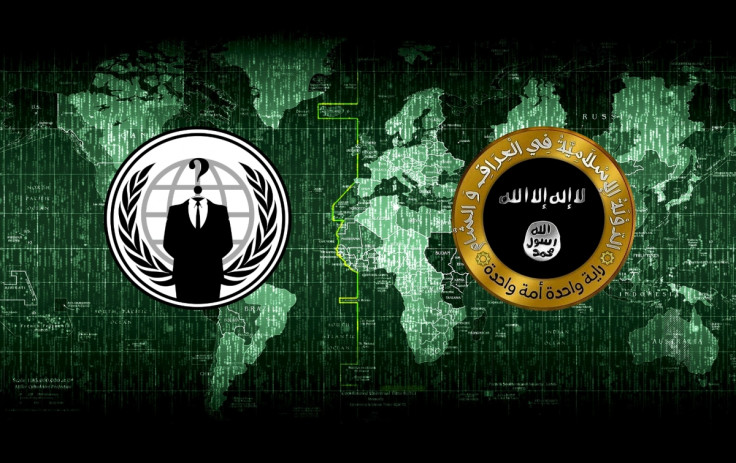How Anonymous' #OpParis campaign may actually be helping Isis

On 21 November, a document appeared online that claimed to list the details of several Islamic State (Isis) attacks set to take place across Europe and Asia the following day. Members of the hacktivist group Anonymous said that they were behind the leak and global media – this publication included – wasted no time in reporting the document's claims.
The next day came and went and the terror threats didn't materialise. It might be that IS was thwarted by law enforcement after the threats were brought to its attention, though this seems increasingly unlikely. The FBI released a statement regarding the threats, stating that the bureau had no "specific or credible information of an attack". What is more likely is that the incident is the latest in a string of misinformation coming from the hacker collective in the frenzy that has followed the attacks on Paris.
The "official" Anonymous Twitter account was quick to disassociate itself from the document, claiming that it knew nothing about it. This echoed a previous denial from the account that it was not involved in the Op Paris (#OpParis) campaign that sprung up in the aftermath of the Paris attacks. Even more confusingly, those behind Op Paris have since disassociated themselves from the "fake groups" that originally posted the document.
All of Anonymous needs to unite, we will always contradict each other but this time the efforts seem less coordinated than ever.
— Anonymous (@YourAnonNews) November 21, 2015The amorphous nature of Anonymous means that anyone can claim to be a part of Anonymous, all they need is a computer and an internet connection. The campaign against IS – shared using the hashtags #OpIsis, #OpIceIsis and now #OpParis – aims to thwart the terror group's online spread of news and propaganda by attacking websites and reporting social media accounts suspected of being associated with IS. The problem is, without a coordinated approach, it appears to be more chaotic than productive. What's worse, innocent targets are being caught up in the campaign and legitimate counterterrorism operations are being disrupted.
"I think that some of the things that Anonymous is doing are damaging," a member of Ghost Security Group, an independent counterterrorism network, told IBTimes UK. "I've seen some cases where they're attacking innocent websites that might be hosting passages from the Quran but are in now way extremist. They don't really have any counterterrorism experience. They've got the stance that if it has Arabic on it, then they're going to DDoS [distributed denial of service attack] it."
"Anonymous are to intel collection and cyber warfare as bottle rockets are to the space program."
Ghost Security Group has distanced itself from Anonymous in recent months and has not been part of the ongoing Op Paris campaign. Instead it has focused its efforts on gathering intelligence on IS by infiltrating jihadist networks. In July the 14-strong team of linguists, analysts and computer security experts claimed responsibility for foiling terrorist attacks on New York and Tunisia.
Michael Smith , an adviser to the US Congress and co-founder of national security firm Kronos Advisory, said at the time that data collected by the group had been presented to US and Tunisian governments, resulting in the arrests of members of an IS cell on 4 July. In contrast, the "rogue disruption" campaigns of Anonymous interfere with the work of organisations like Ghost Security Group, Smith told IBTimes UK.
"Anonymous does not coordinate their calls for social media account closures with government officials," Smith said. "This can actually serve as a form of interference, which ultimately benefits the enemy. From my own personal experiences, I can assure you this has been the case, especially following the attacks in Paris."
The information gathered by Anonymous members as part of Op Paris has also been criticised by SITE Intelligence Group analyst Rita Katz for being "illegitimate and baseless". The disjointed approach of Anonymous has even been referred to as a "comedy of errors" by long-time Anonymous critic The Jester.
In a recent blogpost, the pseudonymous hacker said: "These idiots are nothing more than an ineffective, directionless, geopolitically clueless, skill-less shoal of morally bankrupt minnows bleating for attention. In short, Anonymous are to intel collection and cyber warfare as bottle rockets are to the space programme."
Where Anonymous could be valuable in the online cyberwar, Ghost Security Group believes, is in taking down websites and social media accounts that are used simply to spread IS propaganda. Unfortunately, a spokesperson for Twitter claimed that the flood of reports against supposed IS supporters by members of Anonymous have so far proven to be "wildly inaccurate".
Un célèbre compte Twitter pro-EI fête sa 300e censure pic.twitter.com/Q8dTj5GFCa
— David Thomson (@_DavidThomson) October 19, 2015According to those coordinating Op Pairs, more than 28,000 Twitter accounts associated with IS and its supporters have been taken as part of the campaign. Unfortunately, even if all of these were legitimate jihadist accounts, it is a never-ending battle that Kronos Adviser founder Smith has described as a game of whack-a-mole. As each account is shut down another one springs up in its place. One IS supporter even boasted on Twitter that their account has been shut down more than 300 times.
In light of that, it is perhaps not surprising to see that the most recent ploy adopted by Op Paris is to Rickroll IS supporters. How much a video of a 1980's on-hit-wonder will do to stifle the biggest terrorist organisation the world's largest terrorist organisation remains unclear.
© Copyright IBTimes 2025. All rights reserved.






















